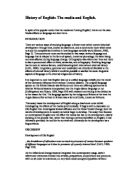The English. It is difficult to describe a national identity of the English. They are inordinately proud of their history, which is a little ironic as, since 1066, they have been ruled by a succession of monarchs from France, Germany, Holland and Wales
“The English”, the book by Jeremy Paxman, begins with the sentence: “Once upon a time the English knew who they were.” The implication is that they don’t know who they are now. While having a lot of sympathy with this opinion, an argument could be made for asserting that they never did know for sure.England derives its name from Angleland, the land of the Angle invaders who swept across the North Sea from Schleswig in northern Germany, to take occupancy of large tracts of Eastern Britain in the 5th century AD. Prior to this the island of Great Britain had been inhabited by Britons and Celts, with a generous sprinkling of the descendants of earlier Roman invaders.Other invading groups arrived during subsequent centuries, including the Saxons, Vikings and Jutes, and the English race, if such a
thing actually exists, developed from a mixture of the original natives and other ethnic arrivals from mainland Europe.Just prior to the final invasion, that of the Normans in 1066, it is likely that the population of the island of Great Britain thought of themselves as Anglo-Saxon. That is certainly the language from which the English language eventually developed.So then the Normans arrived, and there followed a period when the Royal Court spoke French and most ordinary people spoke a derivative of Anglo-Saxon. In fact this situation continued for a considerable period of time and it is difficult to say when ...
This is a preview of the whole essay
thing actually exists, developed from a mixture of the original natives and other ethnic arrivals from mainland Europe.Just prior to the final invasion, that of the Normans in 1066, it is likely that the population of the island of Great Britain thought of themselves as Anglo-Saxon. That is certainly the language from which the English language eventually developed.So then the Normans arrived, and there followed a period when the Royal Court spoke French and most ordinary people spoke a derivative of Anglo-Saxon. In fact this situation continued for a considerable period of time and it is difficult to say when the population as a whole began to think of itself as English.Perhaps the name English was a shortened form of Anglo-Saxon. It is possible that it began to be used to distinguish people from those who were not English, ie. the Welsh to the west and the Scots to the north. During the 11th and 12th centuries, when Llywelyn the Great of Wales was fighting the English king, a clear distinction could be made between the two national groups. A similar distinction was always clear between the English and the Scots, who fought each other quite regularly until the Act of Union made them one nation.The present situation can be confusing for non-British people, and by British we refer to the people of Great Britain (England, Scotland and Wales) and Northern Ireland, together making the United Kingdom.The Welsh, Scots and Irish have a distinct sense of national identity. They also have, in some cases, their own languages: Welsh, and the Irish and Scottish Gaelic. But English is the national language of the UK, although the English people themselves are those only of that part of Great Britain which is not Wales or Scotland or any of the surrounding islands, the Isle of Man and the Channel Islands.It is difficult to describe a national identity of the English. They are inordinately proud of their history, which is a little ironic as, since 1066, they have been ruled by a succession of monarchs from France, Germany, Holland and Wales. It would seem that if and when Prince William comes to the throne, he will be the very first English monarch, however his father is of German/Scottish/Greek ancestry, so even William is not completely English by descent.Confusion reigns also in sports. In the worlds of soccer, rugby and cricket, England has a national team, but in other sports the UK has a national team made up of those from all four countries.In fact it is very difficult to define the English, either in terms of cultural heritage or in any other terms. They are proud of certain figures in their literary history, and have produced some revered engineers, scientists, politicians, soldiers, sports figures and international entertainers. But many of those the world considers to be English, are in fact not English, but British - perhaps from Wales, Scotland or Ireland. Those who are native to these three original nations are naturally peeved to have their national figures dubbed English, and the English themselves are not good at distinguishing, sometimes appearing quite content to share in the reflected glory of one of their neighbours’ heritage.A brief introduction to the English is bound to omit many salient facts as it is a complex subject, reflecting history, culture, wars, language, immigration and many other facets of national life. Simply put the English are the inhabitants of England, but even that is not true. Just ask more recent immigrants from Asia, the West Indies and other parts of the world.







